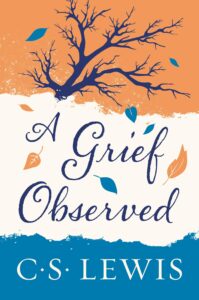 Takeaway: An image of what grief may be like.
Takeaway: An image of what grief may be like.
A Grief Observed is one of those books that I have felt like I needed to read but have not wanted to read. I have not suffered a great loss, whether as a parent, spouse, or child. And so reading about another’s loss seems somehow voyeuristic or at least intruding.
But I bought the Kindle edition a few weeks ago when it was on sale, and I ended up listening to the audiobook (read by Lewis’s stepson Douglas Gresham) because it was part of the Scribd subscription library.
After reading the disappointing Lunch With Lewis, I wanted to read Lewis himself.
A Grief Observed is short, only 68 pages on Kindle and less than 2 hours of audio, including introductions from both Madeleine L’Engle and Douglas Gresham.
In the text, Lewis says he limited himself to four notebooks that he found around the house because if he did not arbitrarily have a limit, there would be no limit to the end of grief (and he wasn’t going to go out and buy more to prolong his writing).
I can see why so many have found this book so comforting while others do not. Lewis is particular. He honestly cries out to God and laments but also looks inside himself for the root and reality of his grief (and hope.) He is also intellectual and deals with the intellectual issues around faith and grief that will not apply to many potential readers.
Like many books, this makes me wonder why Evangelicals have adopted Lewis. He talks about purgatory, prayers for the dead, the possibility of being visited by the dead in this life, and questions our traditional understanding of heaven. Don’t get me wrong; I think it is excellent that Lewis is an Evangelical saint, in part because when people read him directly (instead of the often sanitized versions that are sometimes presented), Evangelicals can see the genuine faith that many outside of the Evangelical world have that look different from their own.
Lewis is an honest man here, albeit a genius with words. His wide-ranging reading and dabbling in literature, philosophy, theology, and psychology mean that he questioned his own feelings and understanding.
This was also not his first grief. His mother died of cancer when he was 6 (also what killed Joy and indirectly Lewis himself.) He had a number of friends die in World War I and colleagues and friends die after that, as well as the death of Mrs Moore. But the death of a spouse has to be different, and closer. And as L’Engle noted, the death of her own husband after 42 years of marriage was different from Joy’s death after just over three years of marriage (when death could have come at any time.)
It is probably too easy to say that I am getting old enough and at a stage in life where I think I understood this more. But it is true. I have a child and another on the way that would mean my own (or my wife’s) death would be very different than a death without children. My age is enough that, while rare, I do know of those that are not too different in age that have passed away and in all likelihood I have less years to live than I have lived.
Lewis is not looking for easy answers or cheap comfort. Instead he simply recounting grief in a way that feels like a gift of presence. There is no simple answer to the problem of evil or the reality of death. So this type of account seems very appropriate and honest.
A Grief Observed by CS Lewis Purchase Links: Paperback, Kindle Edition, Audible.com Audiobook
Part of the Scribd Subscription Library with Audio








